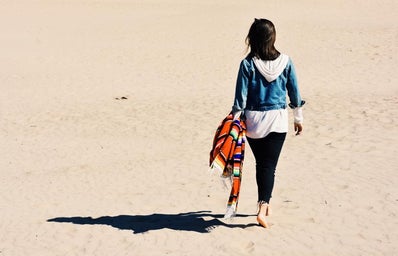Like many impressionable girls in small-town America, I had a very negative perception of drinking. By the time I came to university at eighteen-and-a-half years old, I had never had a drink. Not one. Or any other mind-altering substance, for that matter. When I turned 19 in the latter half of my first year, I figured I was old enough to start acting like the adult I was. Inexplicably, I began to feel too old.
All of a sudden, it felt like I needed to live more adventurously. At 19, I was belatedly struck with the realization that I would never be so young again. I decided to seize the liminality of college and live like a young person. I went to parties. I danced in clubs, bars and even at swing dance nights. I went out to both avoid my schoolwork and celebrate what I had accomplished in class. Over the summer, I enjoyed my free shift drink at the restaurant where I worked, taking advantage of the learning opportunity to finally understand the difference between Merlot and Cabernet.
As my college years went by, I realized that my sober first-years days were far behind me. I recognized that it had been a long time since I would down a cup of Earl Grey and bound out of the door to meet my (tipsy) friends in a packed house party. I couldn’t remember the last time I went more than a week without drinking, even though I never drank as much as some. A desire to drink after any strenuous, stressful or celebratory event began to develop. I didn’t need it, but I found myself craving it like I used to crave sweets. After a particularly drunken New Year’s Eve, I realized it would be good for me to take a break from alcohol. Besides, after ringing in 2020, I couldn’t even look at a glass of wine anymore.
After 31 days without alcohol, I’ve definitely conquered my cravings and come out stronger. It wasn’t exactly easy (just like sticking to a diet or a tough workout isn’t easy) but I’ve come to learn a few things about myself, and our culture:
- The first week was easy.
-
As a bit of a weekend warrior type, I don’t drink during the school week. I try to save money and my booze for a Friday night, either in the bathtub with a favorite book or out on the town with my friends. When I started Dry January, the first week was extremely easy. My January 1st hangover was so bad I didn’t have any desire to drink for a while.
- …and the second week was hard.
-
After the pleasant detox effects of week one wore off, I started to get alcohol FOMO. From my apartment on a Friday night, I could see groups of young people going out and I missed that tipsy, goofy camaraderie. I wanted to join them, but I didn’t want to jeopardize my challenge with peer pressure. I still went to the club, but it was a different feeling. Sober and clear-headed, I noticed every little annoying thing; from the guys who hit on my friends and not me to the music that was just too loud. I didn’t miss the hangover the next day, but I felt more irritated in the moment. I wanted to drink to make a bad night out more fun, but I knew I’d rather keep up my challenge than cave after only 10 days.
- Dating in university became way harder.
-
“Let’s go out for drinks” is a dating app staple. It is a short, casual meet-up for people who want short, casual relationships. During Dry January, I had to wrack my brain to think of things to do with strangers that didn’t involve alcohol. I ended up meeting one guy on campus for coffee/tea, and spent another (rather lovely) afternoon walking around James Bay and Fisherman’s Wharf. As someone who isn’t looking for a relationship, it was a challenge to think of a casual date that didn’t involve alcohol, was in public for safety reasons and wasn’t too serious. I Googled dates without alcohol, and all of them were too romantic! Take a cooking class, really? Star-gaze with a thermos of hot cocoa? What is this, a Hallmark movie? Absolutely not.
- My skin looks amazing (because I’m drinking more water.)
-
My skin was irritated coming home from winter break. Whether it was travelling, the holiday alcohol or those delicious Christmas cookies, I came back to Victoria with several new breakouts in tow. After four weeks of no alcohol, my skin looks great. I suspect it’s something to do with how much water I’m drinking. Craving some sort of flavor when I cut out alcohol, I started drinking herbal chai teas, kombucha and sparkling water with lime more frequently than usual. The dehydrating effects of alcohol are well-known, so when I replaced my four (or five!) drinks a week with hydrating beverages, I noticed a huge difference in the texture of my skin. My acne didn’t disappear, but my skin looks more hydrated and I’ve experienced fewer breakouts.
- I stuck to my evening routine.
-
After a long night on the town, it’s so easy to just fall into bed. My Dry January actually helped me keep my New Year’s resolution, which was to establish a relaxing nighttime routine. With the exception of one late night spent finishing a paper, I was able to stretch, do my skincare routine, light my lavender candle, journal about what I’m grateful for, and read a few chapters of my Agatha Christie mystery novel every single night, even on weekends. I loved the sense of peace and stability this routine offered me and I didn’t even need a glass of pinot on a Friday night to feel relaxed and comfortable.
- My weekends felt longer.
-
In the same vein as my nighttime routine, I felt like I had more time in the day. I made plans to take baths, watch movies and make dinner at friend’s houses instead of going out. I felt like my weekends were longer and that I had time to go to the gym on Sunday morning, meal prep, and do homework without feeling like I had run out of time before Monday.
- I saved money.
-
This was a huge benefit of Dry January. Not only did I save money by not buying alcohol, my habits changed. I no longer spent money on cabs, because my nights out ended early enough to bus home. I didn’t pay cover at clubs when I went out because I chose to visit bars with live music instead. I saved money and even treated my friends with the money I saved, which made me feel amazing.
- …and I’m sure my tolerance has lowered (hooray for saving money in the future!)
-
One of the biggest reasons I took January off from alcohol was to reset my tolerance levels. As a petite woman, I used to do very well for myself off of 1 or 2 ciders. Now in my fourth year of university — with fourth-year stress — it took more than that. I’m looking forward to saving money in the future, and I’m sure it’s better for my health to have a lower tolerance.
- I noticed how reliant our culture is on alcohol.
-
Even though Canada and the United States are more puritan about alcohol than Europe, this experience really made me feel for the people in my life who are working on their sobriety. Adult life and alcohol often feel synonymous. Not drinking felt like a deliberate rebuff to the culture. I tried not to bring up that I wasn’t drinking, and if I did I tried to make it a joke (“Not to be THAT girl who wouldn’t shut up about Dry January but…”) In reality, I was serious about completing the challenge I set for myself. It made me realize how we as a society rely on alcohol, even though we try to shield that fact. We rely on it to talk to new people, even as we encourage others to “put themselves out there.” We rely on it to dance and feel free, even though we pin quotes like “dance as if no one is watching.” We rely on it to relax and forget our troubles, even as we insist on the value of meditation and wellness.
Dry January has opened my eyes to how our world uses alcohol as a crutch for situations that may be difficult or make us feel awkward. Sober, a lame party is a lame party; with alcohol, you just don’t notice that it isn’t fun. Pushing past that, as my sober friend calls it, and living a “raw reality,” as my sober friend calls it, is something I deeply admire and respect. To put down the drink and live courageously is something that I want to take into my future. Doing Dry January as a university student surrounded by temptation wasn’t easy, but I’m glad I completed the challenge. I’ll definitely take these lessons into the future, and I’m sure this won’t be my last Dry January.



